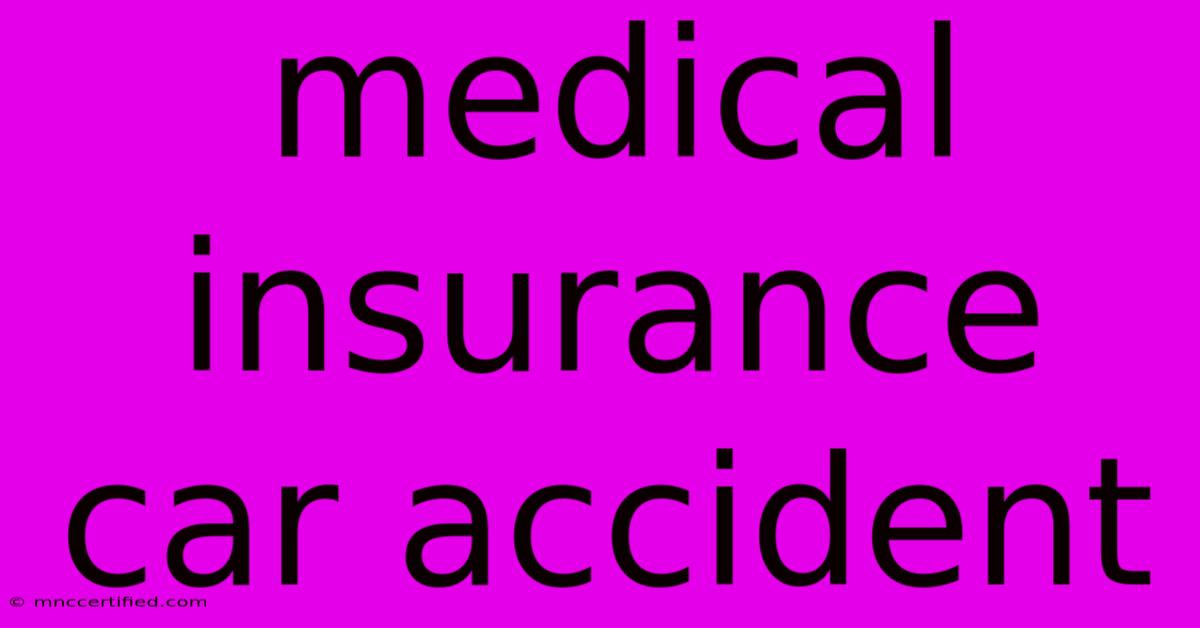Medical Insurance Car Accident

Table of Contents
Navigating Medical Insurance After a Car Accident: A Comprehensive Guide
Getting into a car accident is stressful enough, but dealing with the aftermath, especially concerning medical insurance, can feel overwhelming. This comprehensive guide will walk you through the process, helping you understand your rights and responsibilities, and ensuring you receive the necessary medical care without financial burden.
Understanding Your Insurance Coverage
The first step is understanding your existing health insurance policy. Knowing your coverage details is crucial, as it will dictate how your medical bills are handled. Key aspects to review include:
- Deductible: The amount you must pay out-of-pocket before your insurance begins to cover expenses.
- Copay: A fixed amount you pay for each doctor's visit or service.
- Coinsurance: The percentage of costs you share with your insurance company after meeting your deductible.
- Out-of-pocket maximum: The maximum amount you'll pay in a year before your insurance covers 100% of your expenses.
- Network Providers: Doctors and facilities your insurance covers at a negotiated rate. Using in-network providers is generally more cost-effective.
Different types of health insurance plans (HMO, PPO, POS, etc.) have varying levels of coverage and restrictions. Carefully examine your policy documents or contact your insurance provider directly to clarify any uncertainties.
Dealing with the Other Driver's Insurance
If the accident wasn't your fault, the other driver's insurance company's liability coverage should cover your medical bills. However, navigating this process can be complex:
- Document everything: Take photos of the accident scene, damage to vehicles, and any visible injuries. Obtain contact information from witnesses. Detailed documentation is crucial for your claim.
- Report the accident: File a police report and notify your own insurance company immediately.
- Seek medical attention promptly: Even if injuries seem minor, seek medical evaluation to document all injuries. Delayed treatment can complicate claims and negatively impact compensation.
- Follow your doctor's orders: Adhere to all recommended treatments and therapy. Non-compliance can weaken your claim.
- Contact the at-fault driver's insurance: File a claim and provide all necessary documentation. Be prepared for negotiations. Consider legal counsel if the insurance company is uncooperative or offers an unreasonable settlement.
Personal Injury Protection (PIP) Coverage
Many states require PIP coverage, which covers your medical expenses and lost wages regardless of fault. This coverage is particularly beneficial if you're injured in an accident and the other driver is uninsured or underinsured. Understanding your PIP benefits is essential for timely medical care.
When to Seek Legal Assistance
If you've sustained significant injuries, are facing difficulties with insurance companies, or believe you're entitled to further compensation, it's highly recommended to consult a personal injury attorney. A lawyer specializing in car accident claims can help navigate the legal complexities and ensure you receive fair compensation for your medical bills and other losses.
Preventing Future Issues: Proactive Steps
- Review your insurance policy regularly: Ensure your coverage meets your needs and adjust it as necessary.
- Maintain accurate records: Keep copies of your insurance card, policy documents, and medical records.
- Understand your state's laws: Familiarize yourself with your state's requirements regarding auto insurance and accident reporting.
By understanding your insurance coverage, documenting the accident thoroughly, and seeking appropriate medical care, you can effectively manage the medical insurance aspects of a car accident and focus on your recovery. Remember, proactive steps and potentially seeking legal advice can make a significant difference in the outcome.

Thank you for visiting our website wich cover about Medical Insurance Car Accident. We hope the information provided has been useful to you. Feel free to contact us if you have any questions or need further assistance. See you next time and dont miss to bookmark.
Featured Posts
-
Best Pet Insurance In Missouri
Nov 27, 2024
-
Legal Guardian Shares Wendys Status
Nov 27, 2024
-
Search Continues 8 Missing After Egypt Boat Sinking
Nov 27, 2024
-
Rugby Club Saracens Chiefs Short Tenure Ends
Nov 27, 2024
-
Empty Shelves At Morrisons Shopper Anger
Nov 27, 2024